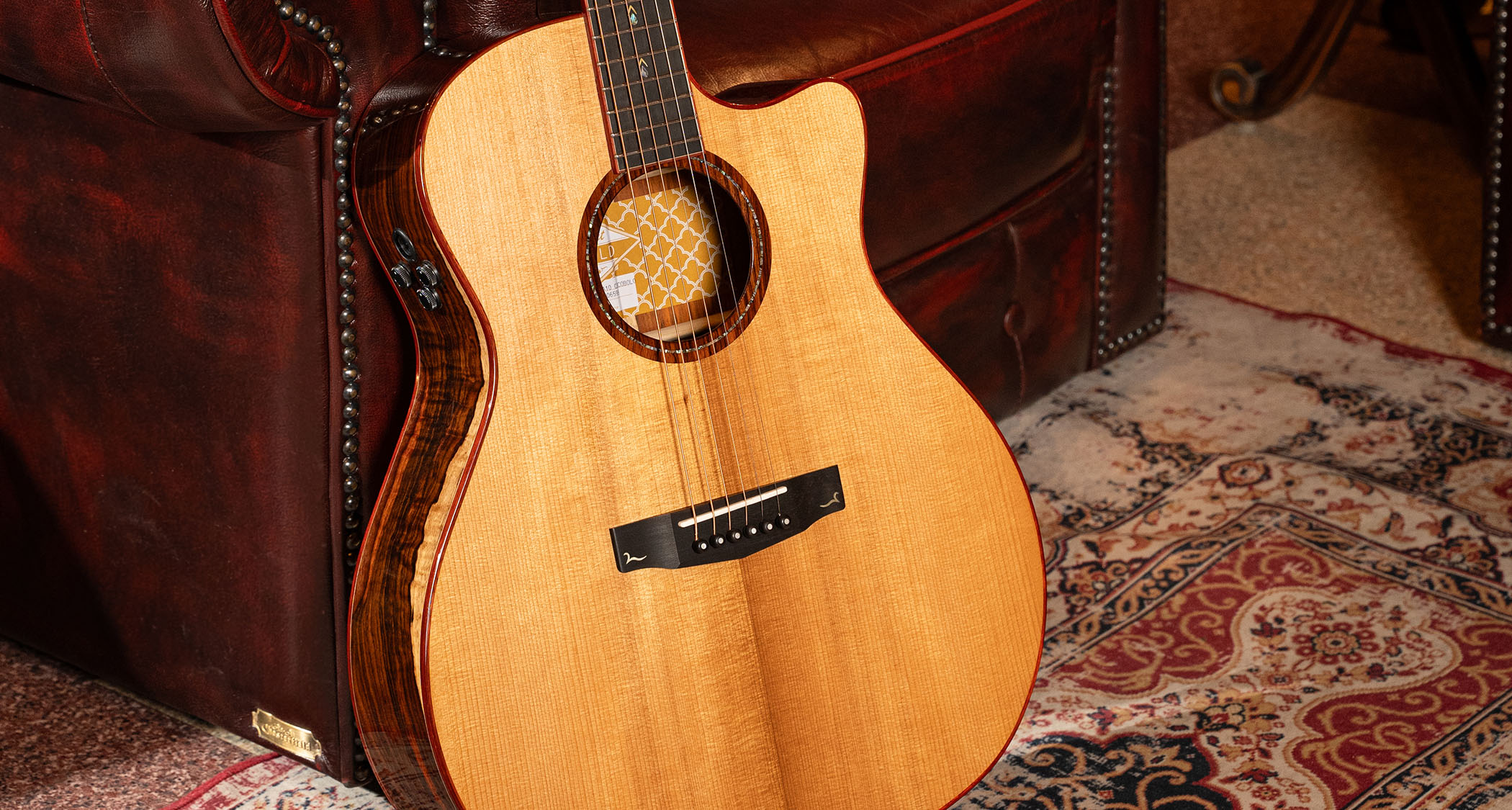Joe Dart: “The one thing you absolutely can’t skip on is developing great time”
The Vulfpeck player on beginnings, bass advice and his signature Music Man
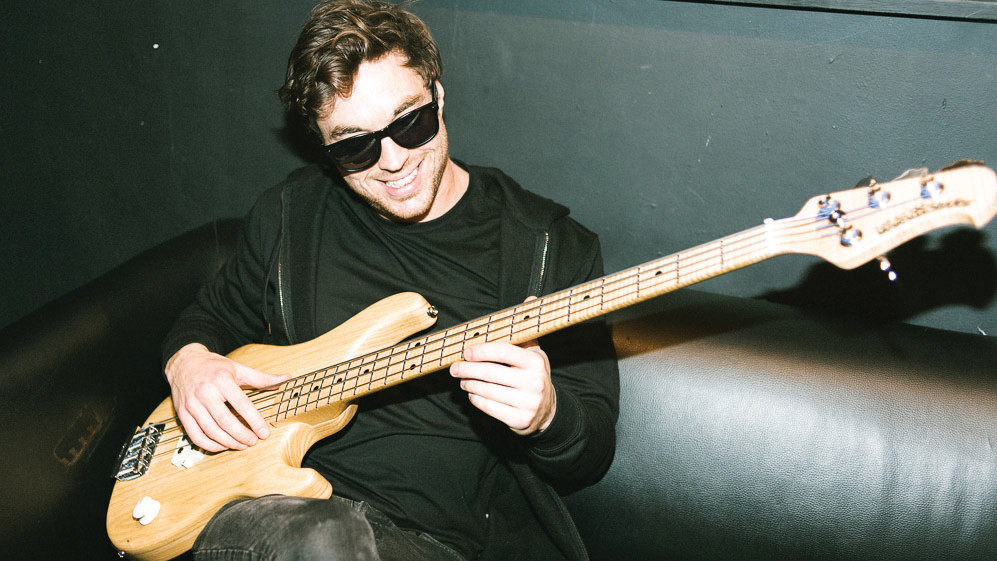
We asked you to nominate the hottest bassist on the planet - and the overwhelming winner was Joe Dart of Vulfpeck.
With that triumph, plus a new signature bass from Ernie Ball and a fantastic year ahead for Vulfpeck, there’s little wonder that Dart is a happy man when we sit down for a bass-heavy chat...
“I’ve got to say, between having my name on the headstock of a Music Man and being on the cover of Bass Guitar Magazine - these are bucket-list moments for me... I’m feeling very lucky. Thank you. It’s an incredible honour.”
When my dad realised that he had five children, all of whom loved music as kids, he said, ‘Well, why don’t we have a family band?’
No need to thank us, Joe - thank the thousands of voters who made you the top of our recent poll. And, of course, the many fans of Vulfpeck who have elevated the California-based band from an obscure funk college outfit to one of the most genuinely exciting creative forces operating today. The occasional negative comment is thrown at Vulfpeck when their name comes up online, where they’ve primarily been exposed until now (although that’s changing thanks to you, readers).
Criticism of the band usually involves the word ‘hipsters’, which instantly reveals the middle-aged demographic of the critics, an age range that I and most of this magazine’s staff share - but any serious analysis of the group and its music reveals that they’re as far from a flash-in-the-pan fashion trend as you can get. In bass terms alone, those who know the subject - such as our friends at No Treble and elsewhere - recognised Dart’s phenomenally funky skills as far back as their first appearances in 2011.
Four albums, four EPs and a clutch of Spotify releases later - including the brilliant, music-free Sleepify of 2014, designed to game the streaming system - Vulfpeck are established as the thinking musician’s funk band for the third decade of this century. When we sat down with Dart, still only 27, it’s clear that those rewards have been gained thanks to much hard work as well as talent.
Is it rewarding to get this level of recognition from the bass community, Joe?
Get the MusicRadar Newsletter
Want all the hottest music and gear news, reviews, deals, features and more, direct to your inbox? Sign up here.
“It’s the coolest thing for me. When I hear young bass players come up to me after shows and say, ‘You’re the reason I started’, or ‘You’re the reason I stuck with it’, that’s the highest honour for me.”
How long have you been playing bass?
“I started when I was about eight years old. When my dad realised that he had five children, all of whom loved music as kids, he said, ‘Well, why don’t we have a family band?’ We literally had one instrument assigned to each of us, and a basement with a drum set, a bass, a guitar and keys.”
He sounds like a cool dad.
“The coolest. So about age eight, I had a Samick bass with action about a foot high, and luckily, developed my finger strength and dexterity on a bass that was impossible to play. The second bass I ever got was a Fender, then the third bass I got was a Music Man.”
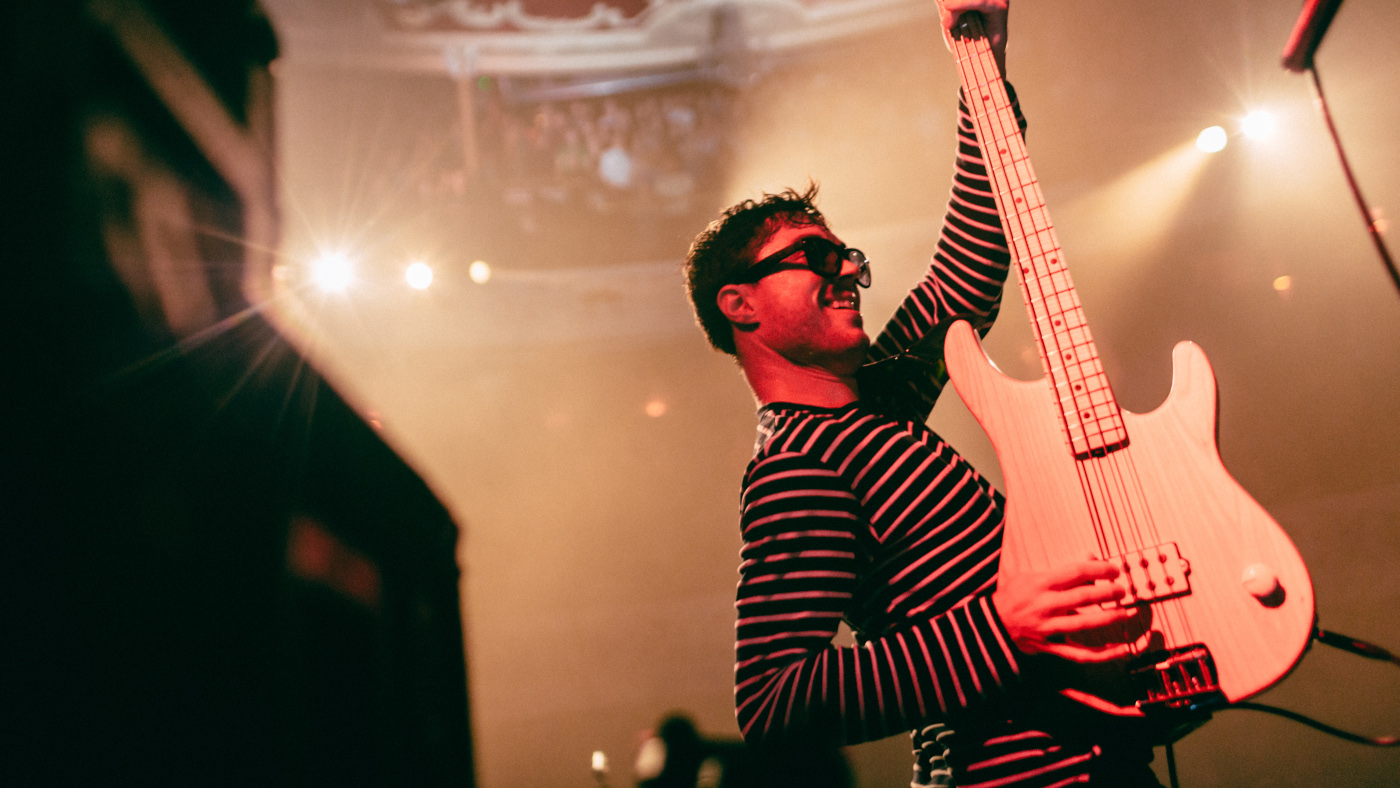
Michigan man
Where did you grow up?
“I grew up in northern Michigan, the middle of nowhere - you would think it would not be a musical hotbed, but there were a couple of great bass players from Detroit, Chicago and even New York. They would be Michiganders originally, move out to the coast to play, and decide to semi-retire.”
Any names we would know?
“Probably not. These guys were all working bass players in New York and LA in the 80s and 90s, and when they had kids and a family, they thought, ‘Maybe we’ll go back to the Midwest’. They would teach at the local music shop, they would gig on the weekends at the local pub. I would see them play on the weekend, and then have a lesson with them during the week. They were great teachers and great players, and they steered me down the funk bass track.”
I remember as a kid dancing around the living room to Prince, Michael Jackson and Stevie Wonder
Why do you prefer that style?
“It was a confluence of the influences of my parents and my bass teachers, who happened to be in the sphere of funk music. My mom and dad loved Stevie Wonder and Prince. My mom saw Prince, like, four times. We had his music on around the house: I remember as a kid dancing around the living room to Prince, Michael Jackson and Stevie Wonder. My bass teachers realised that as a young bass player, nothing will get you excited like a band that features the bass prominently. For me, that was the Red Hot Chili Peppers, and then later Earth, Wind & Fire, Sly & The Family Stone. I fell in love with it.”
You use a super-tight, Rocco Prestia-type picking style.
“One of my heroes. When I think back to starting to play bass, I could have learned using one finger, two fingers, three fingers, or a pick, but it just so happened that my primary teacher was a two-finger bass player. The downside of that is I don’t have the full three-finger dexterity. I also didn’t learn the kind of Victor-style slap thing. I learned the Flea-style slap thing. But the Rocco 16ths muted thing just spoke to me.”
How did you meet the other Vulfpeck musicians?
“When I came down to Ann Arbor, where the University of Michigan music school is, I saw an amazing band called My Dear Disco, which was a synth-pop band with a synth player on one side and an organ player on the other, a great singer, a great drummer, bass player and guitarist. Two of the guys in that band would later go on to be my bandmates, my friends, in Vulfpeck. At the time I was just a high schooler at a sold-out show in a college town, just losing it over this band. I couldn’t believe their energy and their songs. Those guys were Theo Katzman, who plays drums and sings in Vulfpeck, and Joey Dosik, who is a great singer-songwriter in his own right, who also plays with Vulfpeck. I would never have guessed that, after being at that show as a high schooler and being inspired to come to that school, that I would end up playing with those guys. It was so fortuitous. I decided to go to U of M for that reason, and met [bandleader] Jack Stratton after that.”
Semi-schooled
What did you study?
“Jazz bass. I was one of the few guys who came playing electric bass. Pretty much everyone else was on upright. If any kid comes up to me and says, ‘Should I go to music school?’ I would say, ‘Yes, absolutely’. They don’t ask me, ‘Should I finish music school?’ or ‘Should I get a degree in music?’ which is a different thing. But I went to music school, met my future bandmates, and it never would have happened if I hadn’t gone.”
I didn’t know what Vulfpeck would be. Stratton had a little bit of a vision, but I think even he had no idea what it would turn into
Did you complete your degree?
“I didn’t. I left in 2010 to hit the road with the very band that I saw in high school that inspired me to go to U of M. That was My Dear Disco. When I met Stratton, he had a college funk band called Groove Spoon, and they were looking for a new bass player. That band had a lead singer named Antwaun Stanley, who has gone on to feature in Vulfpeck. Jack and I started playing together, great funk music that Jack was composing, but we were also a great wedding band, with a fantastic horn section, all music-school guys. We would play Earth, Wind & Fire, and we would play Stevie, and all that music that I grew up listening to and learning. I finally got to play with a band that could really play it, and it was fun.”
When did Vulfpeck come along?
“In 2011, Stratton invited me to play the first session of the band that would later become Vulfpeck. I didn’t know what it would be; I don’t think any of us did. Stratton had a little bit of a vision, but I think even he had no idea what it would turn into. We played a session for our buddy’s college project. He was recording straight to tape and his thesis was, ‘I’m going to make a straight-to-tape recording in the school studios, and I’m going to hire a crack team of studio musicians from town to play on it’. That was Stratton, me, Katzman, and Goss. Little did I know that we were making the first Vulfpeck record. We ended up making three more of those, which are little six-track EPs, over the next three years, and since then a studio record every year.”
You’ve come a long way.
“When I look back at it now, we haven’t been a band for 10 years yet, and this year we’re going to play Red Rocks and Madison Square Garden. I couldn’t be more stoked. I feel so lucky because this is exactly what I wanted. When I came to music school, I wanted to find a band to join. When I found a band to join, I hoped that we would make some records and do some tours and chase the dream. Vulfpeck has done that in our strange way, and now we’re playing some real shows, we’re playing some real tours, and we’ve made some cool records, and I hope the slow and steady progress continues for a long time because it’s still really fun.”
Have you always been a musician in that time?
“You know, there were times where the bank account got really low, but I have found a way to make music my living since college. That’s probably the main bit of good fortune. I feel very lucky to say today that I can write ‘musician’ on the occupation line of a form.”
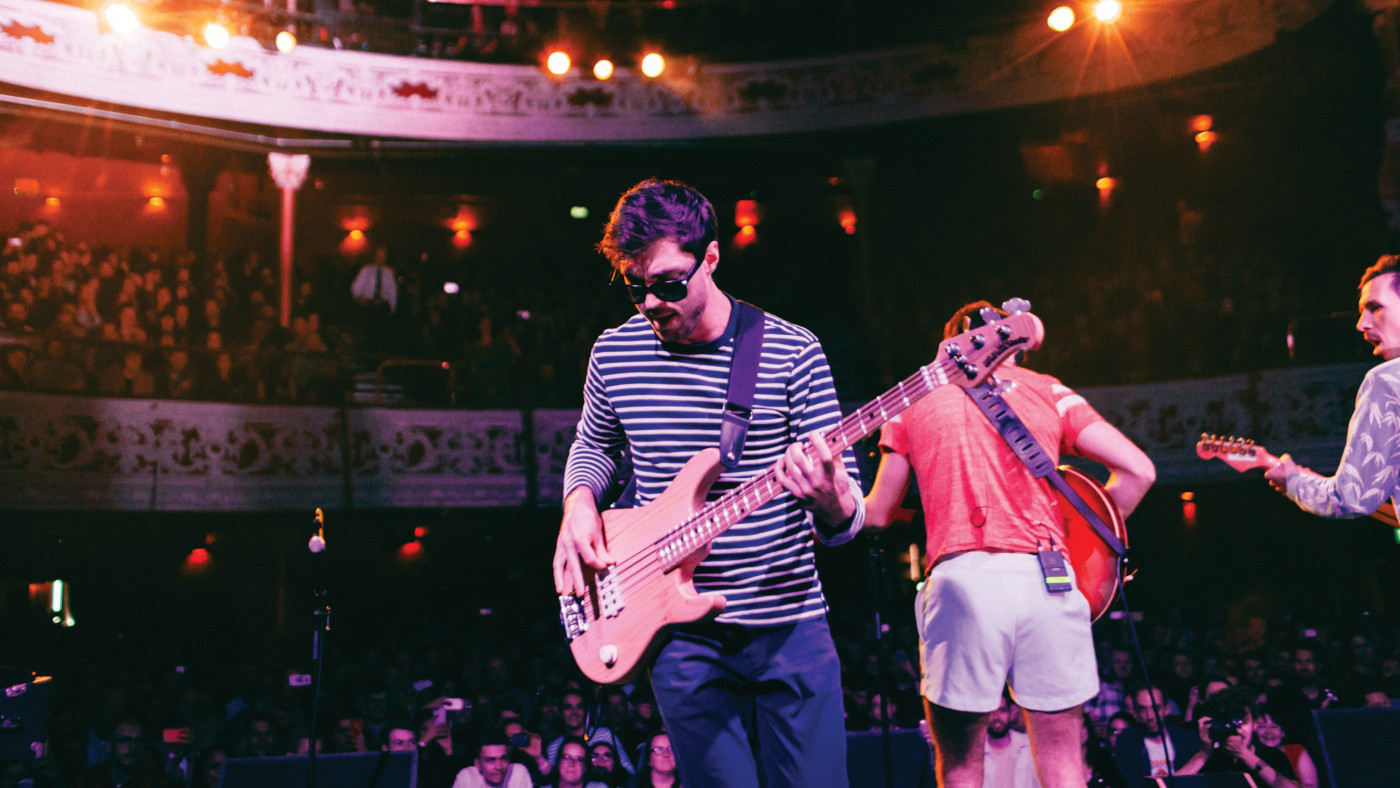
Having a Ball
Let’s talk bass gear.
“When I started with Vulfpeck, I was playing the one bass I owned, a Fender Jazz. Since then, I’ve picked up a handful of axes that Stratton owns for this or that session. If something had a more Jamerson bent to it, Stratton’s little Squier P-Bass might do the trick. For a long time the biggest song that Vulfpeck recorded, ‘Beastly’, was on that bass.”
When did you switch to Ernie Ball?
“What happened was that I played Stratton’s Music Man clone on a Vulfpeck track called ‘It Gets Funkier’. That was probably the best tone we ever got on a Vulfpeck track, and so after that we thought we should probably get the real thing. We borrowed a Stingray, we borrowed a Sterling Classic, and played those on a few Vulf tracks to great effect, but even then still didn’t own one until Ernie Ball reached out to me and said, ‘Hey, do you want to come demo some of these new basses we have?’ I flew out to San Luis Obispo, where I demoed some of the axes. I loved them, and they said, ‘If you want one, I think we can hook you up’. That’s how I got my first Ernie Ball axe, about three years ago.”
One knob, one pickup, white on wood - I haven’t seen anything like it. We feel like we brought something new into the world
Which leads us to your new Joe Dart signature bass, which sold out its 50-unit run really fast.
“We became friends, me and the guys at Ernie Ball, and we were talking one day and they said, ‘We’d love to make you a custom bass if you’ve got any ideas for a unique instrument’. Stratton and I had been talking about that exact bass that I told you about that I played on ‘It Gets Funkier’, which was a cheap Music Man copy. Stratton and I said, ‘What if we could build one that felt and looked like that, except good?’ So we took that idea and ran with it. We brought them the copy and my Jazz bass, and we said, ‘Let’s make a hybrid of these two’.”
Tell us about the spec.
“It has one knob, one pickup, and it’s passive. The whole thing started out as Jack’s idea. He calls it the single-speed bass. Me and Jack both fell over when I took it out of the box, because they completely nailed it. It’s exactly what we envisioned, to a point where to see it in the real world, even right now, is pretty surreal. I’ve gotten a lot of great comments about it along the road. I took the prototype that we built out on a couple of tours, and it’s been funny to see people taking a closer look.
“We wanted flatwounds that have a brightness to them and give you that really old-school disco tone. It’s a very sweet little axe. It’s very much my childhood dream. It’s cool to see something that’s only in your mind come into being and be a physical thing. The look of the one knob, one pickup, white on wood - I haven’t seen anything like it. We feel like we brought something new into the world.”
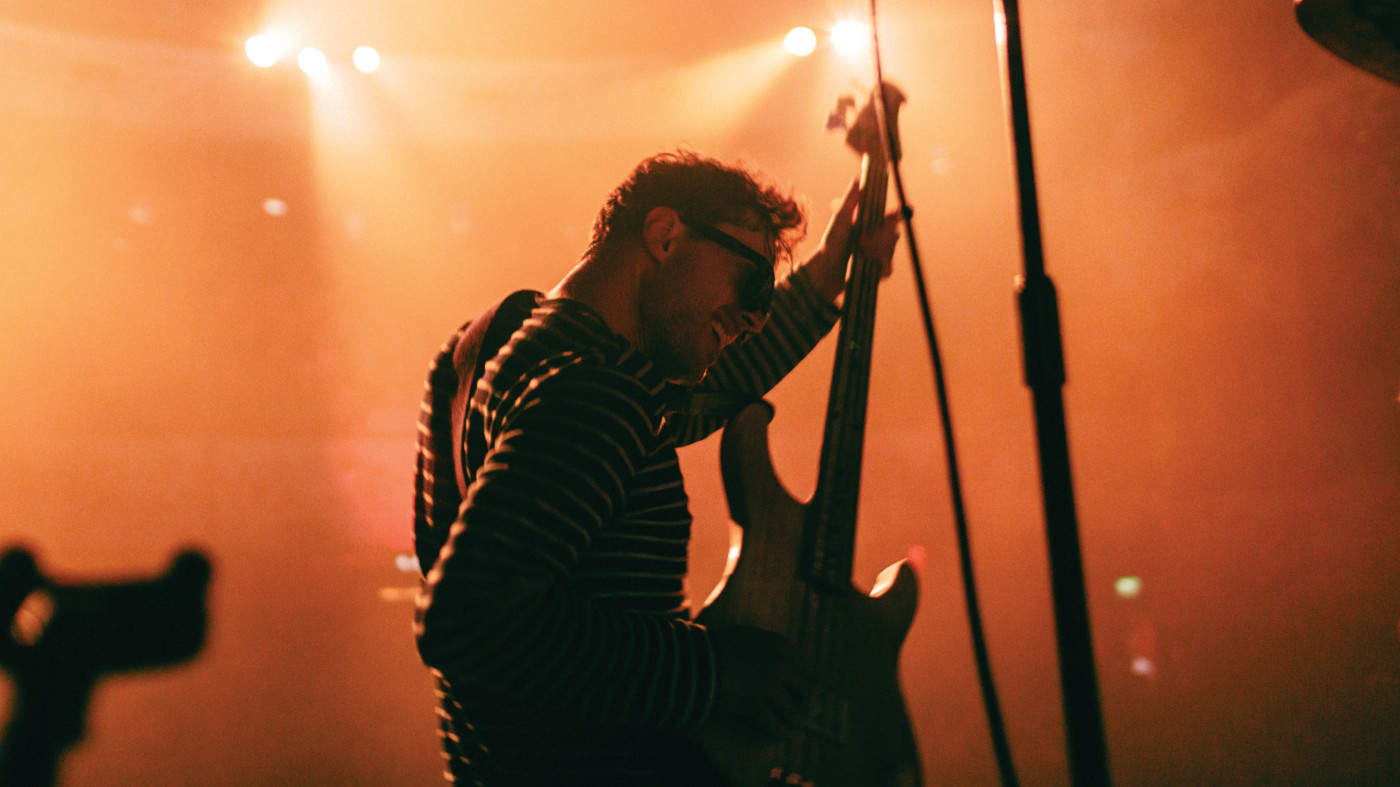
Rigged
Run us through the amps you use.
“I’ve been playing this Joe Dart bass through a Markbass rig. I’ve got the Markbass Tube and I love it. It has a transparency that allows you to hear everything you’re doing warmed up, rounded out, punchy, deep, but at the same time without any added character that isn’t already coming out of your fingers. So, to me, it’s like it’s not hyper-modern, but it’s not hyper-old-school either. I really think they nailed it. And they’re also light as hell. It’s amazing, carrying a 4x10 up a set of stairs, you really notice.”
My advice is always develop good time, and build good stamina to be able to play with good time throughout the whole song
Any effects?
“I don’t have a pedal rig at the moment.”
Straight in?
“Straight in, yeah. And that’s how we do it in the studio, too, direct bass. Nothing to hide behind, and one volume knob. It’s about as minimal as you can get - four strings, a volume knob, direct into the amp.”
What advice do you have for us about how to evolve as a bass player?
“My advice is always develop good time, and build good stamina to be able to play with good time throughout the whole song. Stamina will come, and in the meantime you can learn vocabulary by listening to great bass players. To me, the one thing that you absolutely can’t skip on, especially when you’re young and just learning, is developing great time, because you’re going to play with a bunch of different drummers throughout your life. Every one is going to put the time somewhere else, and you should be able to always be the bridge between the drummer and the rest of the band and make it feel good. That’s a huge thing I think about when I think about what I want to practice.”
Jack Bruce said the job of the bass player is to make the drummer sound good.
“I love it. That’s great. That’s fantastic. Theo Katzman always says that playing bass is playing drums on a guitar. It has that percussive element, and you’re really digging in, and it can be really physical, but you’re playing on a harmonic instrument, and so you really do have to bridge those two things. That’s why I feel that time is so important.”
What’s coming up for Vulfpeck?
“We’ve got an exciting 2019. We’ll get together in some cool studios and put a record out in the fall, and we’ve got a couple of bucket list tour experiences: Madison Square Garden in September, which I still can’t believe is real, and Red Rocks in the spring. Between those, I can almost die a happy man.”


“I can write anything... Just tell me what you want. You want death metal in C? Okay, here it is. A little country and western? Reggae, blues, whatever”: Yngwie Malmsteen on classical epiphanies, modern art and why he embraces the cliff edge
“You're by far the best guy that we've tried. I would love to have you in the band”: So why did Trent Reznor turn down Richie Kotzen for Nine Inch Nails?









